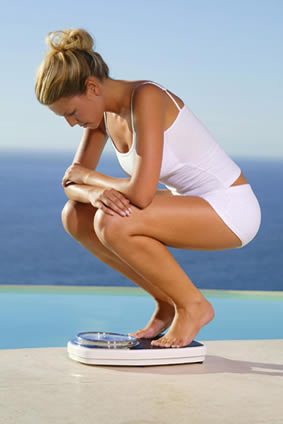Food and It's Effect On a Man's Body...
 Women are the major users of weight loss programs and diets. Men tend to focus more on exercise. But either topic is, and should be, popular with both sexes. Men, too, need to concern themselves with proper diet and nutrition as part of a rounded program of weight loss and health. Women are the major users of weight loss programs and diets. Men tend to focus more on exercise. But either topic is, and should be, popular with both sexes. Men, too, need to concern themselves with proper diet and nutrition as part of a rounded program of weight loss and health.
Particularly with the onset of middle age, diet becomes a greater concern for men. Calorie needs are typically highest in the mid-20s and taper off about 2-4% with every passing decade. For an average-sized male (say, 5 ft 9 inches and 170 lbs), the average number of appropriate calories per day, 2500, reduces to 2200-2350.
One of the reasons for the change is an average reduction in muscle mass. It takes a lot of calories to continue to feed blood to muscles, to perform cellular repair and maintain internal body temperature among other physiological tasks. As men age, they tend to have less muscle mass, thus requiring fewer calories.
But the other major reason is a shift in basal metabolism. That's the 'base' or 'natural' rate at which your body burns calories for all its functions, even at rest. That amounts to about 70 calories per hour for most men, and constitutes about 65% of the daily calories needed. Hormonal and other natural changes with age reduce that basal rate.
The thyroid, which participates in regulation, and other glands tends to be less active and less efficient as we age. The adrenal gland is another example. Glandular reduction is one of the internal factors that actually defines biological aging, in fact.
As a result, taking in the same number of calories in mid-life that were consumed during earlier decades will result in the excess being stored in adipose tissue, in other words you'll gain body fat. For most men, that body fat is considered unsightly, and beyond a certain level has definite health risks.
Though it's not the only number you should look at, a BMI (Body Mass Index = weight/height squared) > 30 should be a concern for nearly anyone. A BMI over 40 is generally considered obese. Waist circumference - over 35 inches - for the average male is an indicator, with over 40 inches considered obese for most.
Whatever you eat - while it does matter for nutritional and general health reasons - taking in more calories than are burn off leads to the excess being stored as fat. That leads to weight gain. Reducing the daily intake by as little as 50-100 calories per day for every decade past age 29 can go a long way toward eliminating that problem.
Alternatively, and a good thing for other reasons, burning an extra 50-100 calories will help solve that problem and lead to better overall health. An extra mile per day walking is enough to accomplish that.
Reduce calories, stay active and you can look and feel fit for a lifetime.
Food and It's Effect On a Woman's Body
 Women, to put it bluntly, are biologically different from men. Those differences imply some guidelines for diet, exercise and health matters in general. Women, to put it bluntly, are biologically different from men. Those differences imply some guidelines for diet, exercise and health matters in general.
Women, for example, naturally have a higher percentage of body fat than men, 27% on average compared to 15% for a fit individual. That single number alone is helpful information if one of your weight loss or exercise goals is fat reduction. Any woman trying to reduce her percentage should take into account this natural difference, since it can help avoid guilt and provide a realistic goal.
Women experience hormonal changes that differ considerably from that of men as they age. Even young women can have irregularities in menstrual cycle and other physiological changes as a result.
The ill effects of PMS (Premenstrual Syndrome) can be reduced by stabilizing blood sugar levels, regulating fat intake and other dietary changes. For example, mood swings can be smoothed out to a degree by higher amounts of soluble fiber, which helps produce a slower rise in blood sugar. Apples, oats and beans are good sources.
Combining fat with protein and carbohydrate intake in a balanced way will help slow the rise in blood sugar from the carbohydrate consumption. Ice cream may be a comfort food but the effect is short-lived and doesn't provide the balance needed. Instead, increase consumption of fresh fruit and vegetables. Bananas are a good choice, along with walnuts.
Women are more prone to arthritis, fibromyalgia and other conditions. Certain previously unsuspected food allergies can worsen the symptoms. Testing is essential, but at the same time a healthy diet will help. Rice beverages can be substituted for those sensitive to cows milk, and there are wheat-free breads on the market that are still whole grain. Peanuts may need to be avoided for some.
For example some women who suffer from rheumatic symptoms will find they are allergic to wheat. A gluten-free diet will help lessen that problem. This includes finding substitutes for ordinary cereal, standard bread, pasta and other foods made from wheat flour.
During the years of menopause, as cycles become less regular and large hormonal changes are occurring, diet can help lessen the severity of any discomfort. Lowering sodium intake is helpful. Substitutes include herbs, garlic or lemon juice for flavoring. Each individual is different, though, and you should consult a physician for proper amounts.
Menopausal women are likely to benefit from reducing saturated fats, beyond that of younger women or males. Since estrogen levels are declining, HDL cholesterol (the beneficial type) will tend to fall and LDL cholesterol (the potentially harmful type) will rise.
One result is that, though men in general have a higher risk of heart attack as they age, during this time a woman's risk is equal to those of men of similar age. Reducing saturated and trans fat can help reduce those risks.
Moderate wine consumption is beneficial. It provides anti-oxidants and other helpful compounds and is generally lower in calories than many alternatives. Lowering caffeine can help reduce loss of calcium, which is more needed as women age.
What constitutes a proper diet varies somewhat by gender and age, so investigate what is right for your particular circumstances. Knowledge is the key to health.
If your lookng for a program that will not only help you take the weight off but keep it off too, take a look at our Rapid Weight Loss Program featuring the easy to use, online EZDietPlanner. Just read through some of our patient success stories and you'll be convinced our program is right for you!
To learn more you can order our FREE medical report entitled: The Real Weight Loss Solution or simply sign up for our FREE Body Fat Analysis.
|
